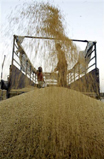
Archive 2009
|
October 16-31, 2007
Wheat Import Plan – Loot of public money
This year wheat production during Rabi season has gone up to 750 lakh tons from 694 lakh tons last year, yet the government decided to import 50 lakh tonnes of wheat. This is to ensure that there are enough stocks to meet the requirements of the Public Distribution System (PDS), according to government. The Central government’s plan to import around 8 lakh tons of wheat at the price of Rs 16 per kg is shocking because it paid only Rs 8.50 per kg to farmers as support price for procuring wheat from them! When farmers asked for higher support price to cover their increased cost, it was denied with the justification that higher procurement prices of wheat would lead to inflation. Now the argument given is that if it does not import, irrespective of what the price is, wheat prices will shoot up as wheat stocks are low in the country! From a wheat surplus nation only a few years ago, India today has turned into the world's largest importer of wheat. India is the world’s second biggest consumer of wheat., hence wheat prices rise in the international market whenever it decides to import wheat. In 2006, wheat price shot up in international markets by 18% within 4 months of India deciding to import wheat. This year, wheat price jumped by 54% over past three months since Indian government first floated tenders for import of wheat. The government rejected the first tender of May 2007 saying that the price of Rs 10.80 per kg was too high, yet imported 5 lakh tons of wheat at Rs 13.30 per kg just two months later. The price now accepted for purchase of 8 lakh tons of wheat is even higher at Rs 16 per kg! . The government is saying that it is being forced to import to build up the stocks as it could not procure sufficient wheat this year from farmers despite higher production. Wheat procurement this season was only 110 lakh tons against its target of 150 lakh tons. The new food grain procurement policy allows big private companies to directly procure from farmers. So far only Food Corporation of India (FCI) was responsible for food grain procurement. When farmers did not want to sell at government - fixed procurement price of Rs 8.50 per kg as it was not remunerative, private companies offered up to Rs 11 per kg and procured whatever quantity they wanted to purchase. By the time FCI decided to increase the procurement price, no more wheat was available for procurement. The Union Agriculture Minister said: "If the farmer is getting a better price [from private buyers], as Agriculture Minister I am the happiest person. However, as a Food Minister, if I face any problem, I will import." With elections around the corner, the government is getting nervous about low food grain stocks. The new procurement policy of allowing private traders has only benefited large farmers. Private traders, sitting over large stocks of wheat, are now manipulating wheat price which has reached all time high. The opportunistic politics of the UPA government is clearly visible in the announcement made now to enhance Rabi season procurement price for wheat to Rs 10 per kg. The enhanced procurement price does not address any problem since wheat was procured by private traders during the last season at a price even higher than that announced for the new season. The plan to import wheat, at nearly double the price of what farmers received, is an outright loot of public money. A few Indian and international food grain traders will benefit from this loot. Once wheat imported at double the price is released into market, wheat price for toiling people of the towns will shoot up in the country. So the burden of the loot will once again be put on the shoulders of people. The wheat import plan must therefore be condemned and opposed as it is anti-people and anti-farmer. The Indian government, on the contrary, must pay and guarantee a remunerative price to wheat farmers of the country. Private traders must not be allowed to hoard food grain and use it to manipulate prices. Protecting and harmonising the interests of both producers and consumers of food is the responsibility of the state. Farmers must receive a price which allows them to recover their cost of production and leave a surplus for their families to lead comfortable lives, besides what is required to put back into farming to keep it in a healthy state. At the same time, the other toiling people have limited earnings and should not be made to pay high prices for food. It can be seen from the plan to import wheat at high prices while denying remunerative prices to Indian farmers themselves that the present Indian state has hurt the interests of toilers of both town and country while allowing a few rich Indian and international food grain traders and hoarders to profit enormously from the situation at the expense of the vast majority of toilers. It once again emphasises the need for the workers and peasants of our country to put an end to the present state of big bourgeoisie and take the control of the state into their own hands. |
 For the second year running, India is importing wheat. Last year the government justified it citing lower output in India. This year, it is planning to import wheat at almost twice the price it is paying as support price to Indian wheat farmers!
For the second year running, India is importing wheat. Last year the government justified it citing lower output in India. This year, it is planning to import wheat at almost twice the price it is paying as support price to Indian wheat farmers! 